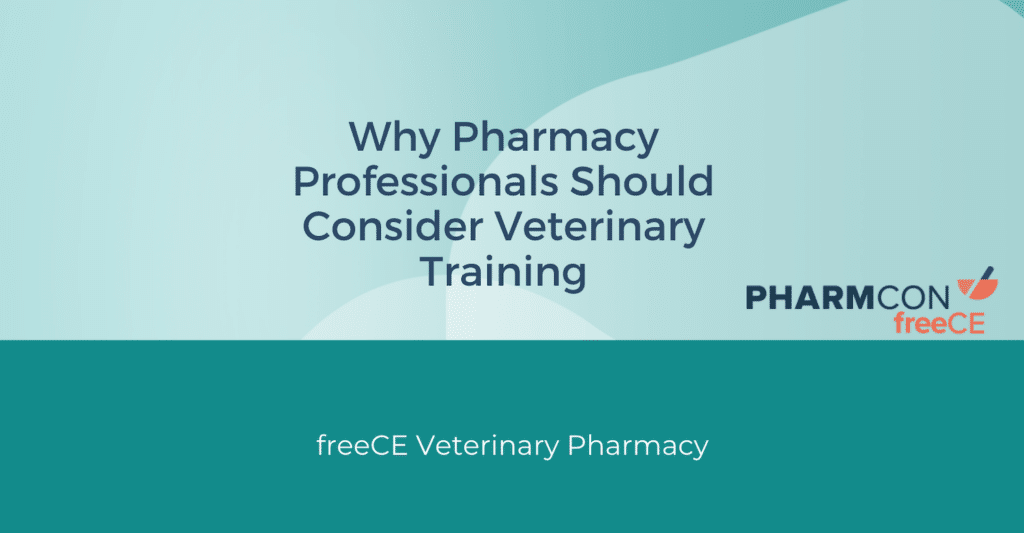As pet ownership continues to rise, the importance of veterinary pharmacy in providing optimal care for animal patients cannot be overstated. However, one issue that plagues the field is the lack of specialized training for pharmacists and pharmacy technicians who fill prescriptions for pets (less than a quarter of pharmacy schools offer didactic courses in veterinary pharmacy!).
Recognizing this gap, freeCE has developed an innovative course, “The Essentials of Veterinary Pharmacy,” aimed at equipping pharmacy professionals to serve animal patients well.
Table of Contents
The Issue: Lack of Veterinary Training for Pharmacists & Pharmacy Technicians Who Fill Prescriptions For Pets
Veterinary pharmacy is a unique branch of pharmacy that requires specialized knowledge and skills to ensure the safe and effective use of medications in animal patients. However, many pharmacists and pharmacy technicians lack formal training in this area, which can lead to potential risks and suboptimal patient care.
What Special Skills Are Required To Provide Care to Animal Patients?
Caring for animal patients presents its own set of challenges and requires knowledge beyond what is typically utilized in human pharmacy practice. Pharmacists and pharmacy technicians providing veterinary pharmacy services need to have a thorough understanding of animal anatomy, physiology, and pharmacology. They need to be familiar with the specific drug interactions, dosage forms, and dosing regimens applicable to different species. Also, they should possess effective communication skills to collaborate with veterinarians and pet owners to ensure optimal medication therapy outcomes for animals.
How Often Do Pharmacists Fill Prescriptions For Pets?
Pharmacists regularly fill prescriptions for pets, and the frequency of these prescriptions is increasing. With the rise in pet ownership, veterinarians frequently rely on pharmacists to provide appropriate medications for their animal patients. This underscores the importance of ensuring that pharmacists and pharmacy technicians have the necessary knowledge and training to fulfill this vital role effectively.
Compounding Veterinary Pharmacy: Customizing Medications for Pets
One of the key aspects of veterinary pharmacy is compounding, which allows pharmacists to tailor medications specifically for the individual needs of pets. While commercially available medications are designed with general dosing and administration guidelines, compounding offers the flexibility to customize medications according to the specific requirements of each animal patient. This personalized approach ensures that pets receive the most effective treatment and have a better chance of responding positively to their medications.
One of the primary benefits of compounding in veterinary pharmacy is precise dosing. Animals, just like humans, come in different shapes, sizes, and species, and their medication needs can vary significantly. Compounding allows pharmacists to adjust the dosage of active ingredients to match the exact requirements of a particular pet. This is particularly crucial for medications with narrow therapeutic windows, where even slight variations in dosage can have significant effects on the animal’s health. By customizing the medication’s strength and formulation, compounding helps to optimize the therapeutic outcome and minimize the risk of adverse effects.
Another advantage of compounding is the ability to add flavors to medications. Pets can be notoriously picky when it comes to taking medications, and the taste of a medication can greatly influence their compliance. Compounding pharmacies can add flavors that appeal to different animals, making the medication more palatable and easier to administer. This improves compliance rates and ensures that pets receive the necessary treatment without any difficulties or resistance.
Furthermore, compounding offers the opportunity to create alternative dosage forms. Some pets may have difficulty swallowing pills or capsules, making traditional medication administration challenging. Compounding allows pharmacists to transform medications into alternative forms such as suspensions, chewable treats, or transdermal gels, which are easier for pets to consume. This versatility in dosage forms enables veterinarians to choose the most suitable option based on the specific needs and preferences of each animal patient.
Working in veterinary compounding can be both rewarding and challenging. Pharmacy professionals who specialize in compounding for pets have the opportunity to make a significant impact on the well-being of animal patients. They collaborate closely with veterinarians and pet owners to understand the unique requirements of each pet and develop tailored medications to meet those needs. This level of customization requires strong attention to detail, knowledge of pharmaceutical science, and the ability to work precisely with measurements and formulations.
These pharmacy professionals need to stay up to date with the latest research, regulations, and compounding techniques to ensure they provide the best possible care for animals. They work closely with veterinarians to understand the specific treatment goals and collaborate on finding the most appropriate medications and formulations. Additionally, they may need to communicate with pet owners to address any concerns, provide instructions on medication administration, and ensure proper compliance.
Please note: the Essentials of Veterinary Pharmacy course does not cover compounding, though we are working on developing resources that will dive into this important function.
Can Pets Take Human Drugs?
While there are instances where human medications can be used in veterinary medicine, it is crucial to recognize that not all human drugs are safe for pets. Pharmacokinetics of common medicines are vastly different in dogs, cats, and horses as compared to humans. Each species has unique variations in absorption, distribution, metabolism, and elimination that should be considered when exploring animal pharmacology. It is essential for pharmacists and pharmacy technicians to be aware of the medications that can be safely administered to pets and those that should be strictly avoided.
Which Human Medications Are Dangerous For Dogs?
Certain human medications can be extremely dangerous and even fatal to dogs. Non-steroidal anti-inflammatory drugs (NSAIDs), such as ibuprofen and naproxen, can cause gastrointestinal ulcers and kidney damage in dogs. Similarly, medications containing acetaminophen can lead to liver damage. It is vital for pharmacists and pharmacy technicians to educate pet owners on the potential risks associated with these medications and recommend appropriate alternatives for pain management or other health conditions.
Which Human Medications Are Dangerous For Cats?
Cats, being unique in their metabolism, have specific medications that can pose significant dangers to their health. For instance, non-prescribed use of medications containing aspirin or acetaminophen in cats can result in severe toxicity, including liver failure. Additionally, certain antidepressant and anti-inflammatory medications can be highly toxic to cats. Pharmacy professionals need to know about these risks and work collaboratively with veterinarians to ensure safe and effective treatment options for feline patients.
Which Human Medications Are Dangerous For Horses?
Horses, as large and powerful animals, have their own set of medication concerns. While some medications, such as non-steroidal anti-inflammatory drugs, can be administered to horses under veterinary supervision, others are strictly prohibited. Medications like clenbuterol, a bronchodilator commonly used in human asthma treatment, are strictly forbidden in horses and can lead to life-threatening consequences. Pharmacists and pharmacy technicians need to be well-versed in the appropriate use of medications for horses to avoid potential harm.
Provide Better Patient Care With Our Accredited Veterinary Pharmacy Course
In light of the specialized knowledge and skills required to excel in veterinary pharmacy, freeCE has developed the Essentials of Veterinary Pharmacy. The Essentials of Veterinary Pharmacy course is a six-hour specialty certificate aimed at helping pharmacy professionals understand the unique pharmacokinetic traits of common companion animals, like dogs and cats, and the clinical care concerns of filling medications at a community pharmacy. This course will aid pharmacy professionals in accurately and safely filling prescriptions for companion animals that they may encounter in daily practice while also earning credits toward licensure compliance.
Learners who complete this certificate program will be better able to:
- Recognize the team members involved in veterinary practice and common misunderstandings that may occur when veterinarians prescribe medications that will be filled at a community pharmacy.
- Identify federal laws and regulations that govern the use of medications in animals.
- Understand basic physical characteristics of companion dogs, cats, and horses and how their unique pharmacokinetic traits may impact medication use and misuse.
- Prevent toxicologic emergencies by better anticipating risks for accidental ingestion of substances dangerous to pets and helping to inform your clients (pet parents) of best safety practices.
- Avoid communication-related errors and those related to abbreviations that may lead to over or underdosage of prescribed active ingredients or toxicity from commonly used excipients.
- Employ appropriate drug information resources to provide confident counseling tips to veterinary clients and other members of the veterinary team.
Future additional certificates will offer advanced clinical information related to therapeutics and medication selection for companion animals, as well as more detailed guidance for compounding for the veterinary patient.
To learn more about the course and enroll, click here.






